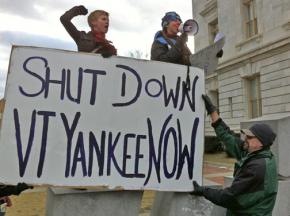Time to shut Vermont’s nuke
reports on the ongoing campaign by activists in Vermont to close a nuclear power plant that the federal government seems determined to keep open.
FIFTY ROWDY protesters held a January 29 speak-out and march against the decision by Federal Judge J. Garvan Murtha to halt the closure of Vermont Yankee nuclear reactor by state officials.
Murtha's decision allows Entergy Corp.--which also owns the Indian Point reactor north of Manhattan and is the second-largest nuclear operator in the U.S.--to continue operating the 39-year-old Mark 1 reactor that is already 20 years past its intended lifespan. The ruling thus ignored both Vermont Yankee's poor safety record as well as the design flaws of the Mark 1, which is the same kind of reactor that melted down in the Fukushima disaster last year.
The SAGE Alliance, an umbrella organization of groups fighting to shut down Vermont Yankee, has called for a series of actions in the lead-up to the previously scheduled closure date of March 21, 2012. The speak-out and march through Burlington's compact downtown was Occupy Burlington's response to that call.
During the action, activists from Occupy Burlington's environmental working group spoke to a wide array of concerns, including the dangers of nuclear power, the devastation in Fukushima, Entergy's pursuit of profit at the expense of safety, and the various false solutions to climate change.

Activists also made the case for a unified, international climate justice movement that can bring together the climate-change and anti-nuclear struggles to demand alternative and sustainable energy instead of "green" capitalism.
Occupy Burlington's embrace of both climate change and anti-nuclear activism is a welcome development.
Keith Brunner, a member of Occupy Burlington's environmental working group, noted how Judge Murtha's decision to trump state law (as well as the federal Nuclear Regulatory Commission's jurisdiction over such matters) is both undemocratic and pro-corporate. "They're really just overriding the huge majority of public sentiment here," said Brunner. "That really fits perfectly with the 99 percent/1 percent message that's coming from Occupy."
Vermont officials are considering whether to appeal the decision, but activists should invest little hope that the courts will side against Entergy and the nuclear industry--unless we can bring a lot more pressure. Entergy won the court case based on the absurd notion that states have no jurisdiction over nuclear safety--only the Nuclear Regulatory Commission, the federal fox guarding the corporate chicken coop, can do so.
The judge followed Entergy's line of argument, finding that Vermont's decision not to renew Vermont Yankee's operating license was secretly because of safety concerns, even though Entergy has a poor track record in honest dealings with the state, including lying to regulators about the existence of underground pipes leaking tritium.
THE NRC and the nuclear industry do not want states or citizens to have the right to condemn nuclear reactors based on safety because most states would say, "Not in my backyard." Fukushima and Chernobyl have shown the deadly and destructive risk posed by all 103 nuclear reactors in the U.S.
What's more, the issue of how to dispose of tons upon tons of nuclear waste has never been solved. Currently, the Vermont Yankee plant stores five times more spent fuel rods than it was originally designed to hold. This waste will be highly radioactive for roughly 1 million years.
So who has our back in preventing a meltdown or ensuring the proper "storage" of nuclear waste? The NRC, according to Judge Murtha. But the NRC is infamous for approving virtually any request by the nuclear industry, which clearly puts profits before people and the environment at every turn. The NRC has never denied the construction, operating license or relicensing of a nuclear plant.
With the courts proving to be a dead end, activists must take on the nuclear industry in a national campaign. Our scope should expand beyond a single plant like Vermont Yankee or Indian Point so that we can take aim at the regulatory power of the NRC, the nuclear weapons industry, and the massive subsidies and taxpayer guarantees that undergird nuclear power. We must demand an end to the Price-Anderson Nuclear Industries Indemnity Act, which limits the damages paid by utilities in the event of a nuclear accident.
But it also must be acknowledged that the current anti-nuclear movement cannot defeat the nuclear industry alone. There must be a climate justice movement that unites groups fighting climate change with those fighting the nuclear industry.
This is the promise of Occupy, recasting these more isolated campaigns into a series of fronts for the 99 percent against the 1 percent, demanding massive investment in a renewable energy infrastructure and public transportation, and thereby good jobs. And we must demand that the 99 percent have a definitive say in the production of energy.
The month of March will bring two important dates: the one-year anniversary of the March 11 Fukushima disaster and the now voided final day of Vermont Yankee's operation. Activists in the SAGE Alliance are holding a mock evacuation of a nuclear accident zone on March 11, marching from the Vermont Yankee plant gates to Brattleboro. Other rallies and direct actions are planned throughout the end of March.
The continued operation of Vermont Yankee should serve as a rallying cry for anyone fighting to protect our environment and to challenge corporate power. Show your solidarity this March, and fight for a future free of fossil fuels and nuclear power.


